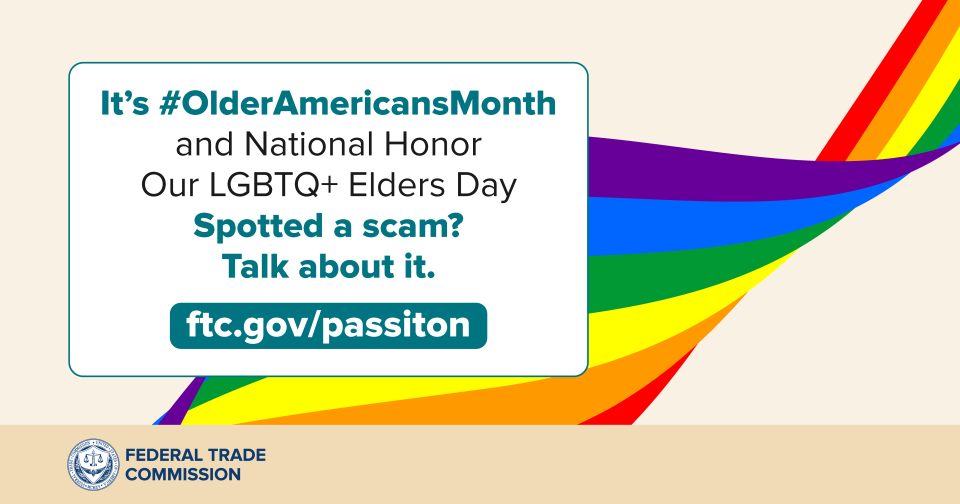
Today is National Honor Our LGBTQ+ Elders Day. There are many ways to celebrate this important occasion, but here at the FTC, we’re focusing on helping LGBTQ+ elders avoid frauds and scams — and we hope you can pitch in too.
Research shows that people who know about scams are less likely to engage with scammers and less likely to lose money. Older American’s Month and National Honor Our LGBTQ+ Elders Day are two great reasons to share what you know about spotting and avoiding scams with friends, family, and people in your own community. Sharing what you know can help protect someone who you know from losing money to a scam.
Not sure where to start? Check out the FTC’s Pass it On campaign for ideas, and then tell people where to find resources.
Want to help your friend who mentions the unwanted calls they’re getting from “Social Security?” Explain that the calls are from scammers posing as government officials. They can’t rely on caller ID, because scammers use technology to fake the numbers they’re calling from. And remind them that there are options for blocking calls.
What if your just-retired uncle starts chatting about the great work-at-home opportunity he found online? Ask if he has to pay up front for the opportunity. Ads that offer to help you start an online business — after you buy a training system — are often scams.
Then, we hope you’ll encourage them to tell the FTC about what happened by visiting ReportFraud.ftc.gov. Because every report helps us, and our law enforcement partners, go after companies committing fraud, scams, and bad business practices that hurt the LGBTQ+ elder community.

FYI, the group just made me aware of this for those that use screen readers for various reasons from low vision/blindness to Autism Spectrum, Alzeheimer's etc. They ask when using Hashtags in your post the screen reader cannot correctly read the Hashtag if each letter at the beginning of the word isn't capitalized.
Ie. #passiton
(the reader translates it as one word. The correct format for screen readers #PassItOn will read it as "Pass It On".
A separate issue would be a problem with other posts that contradict or may have opposite views with an FTC ruling. The Hashtag is ambushed and the user is inundated with a negative message (When searching) Which often outnumbers the FTC's posts and the message is lost in a sea of copycats. The user can spend the day reviewing for these fakes, that seem to be automated. It almost seems as though someone has setup a system to fail or to intentionally deceive the user with a type of spam harassment.
Just an observation.